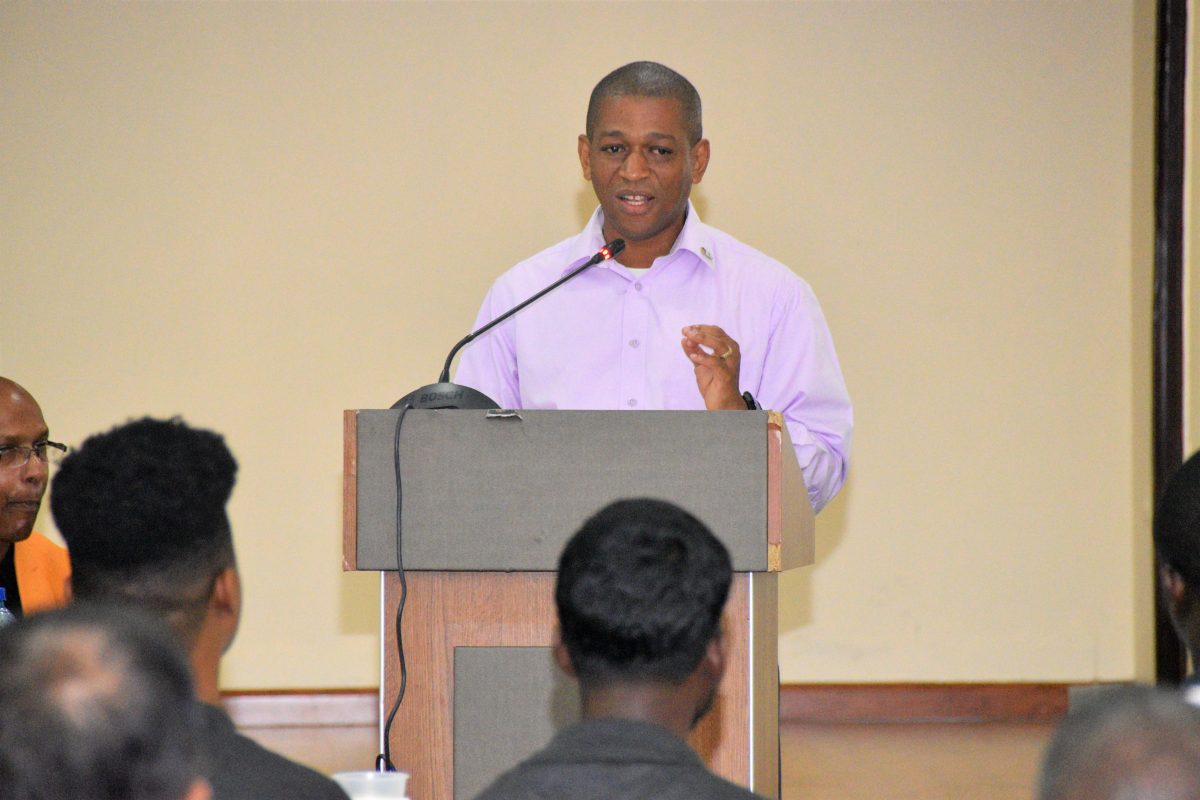With first oil just months away and around six billion barrels of oil equivalent in the offshore Stabroek Block alone, the Director, Department of Energy, Dr. Mark Bynoe on Saturday said that a local oil refinery is not feasible at this point.
Bynoe was at the time speaking to 200 men at the Men’s Regional Convention organised by the Restoration Temple A.O.G., in New York, in collaboration with the Mocha Church of the Nazarene. The Convention was held at the Ramada Hotel, East Bank Demerara.

In his address at the gathering, Bynoe said that his Department will only pursue evidence-based decision making, which will lead to prudent, non-regrettable investments.
“We have never said that there will never be a refinery. At this time a refinery is not feasible… I think what most people are conflating is not if a refinery should come to shore, it’s whether or not we should have cheap fuel. A refinery doesn’t mean cheap fuel or the absence of a refinery doesn’t mean that you will not have cheap fuel, cheap fuel is a policy decision and there are many ways by which you can ultimately have cheap fuel… I cannot advise my Minister to pursue an investment down a rabbit hole. What the Department is concerned about is what we call ‘no-regrets investment’. When you invest today, you must not regret tomorrow… it must be monies that are well spent,” Dr. Bynoe told the gathering.
He further said that the industry must be managed to the benefit of all Guyanese.
“We are accountable first and foremost to the people of Guyana. These resources are not Bynoe’s resources; these resources do not belong to the President of Guyana; they belong to Guyanese… and the minute we stop the distinguishing about ethnicity, the better it will be for all Guyanese,” the Director said. During the interactive session, participant Dornnel McFarlane said as a Communications student at the University of Guyana, he now has a better understanding of the role that he can play in the development of the oil and gas sector.
“I recognise that through the media which has a very important role to play in changing our landscape for the transformation of Guyana. I can play a very integral role in disseminating information that is very objective, that will lead to truth and confidence and that will surely show the real picture. Another thing that stood out to me is that the contracts [are] not as bad as they seem. How Dr. Bynoe explained the contracts, I recognise that it’s really and truly moving Guyana forward,” he said.
The release said that the Department of Energy continues to spearhead interactive sessions, targeting a wide cross- section of persons, to keep them informed about developments in the petroleum sector.

In May 2017, Pedro Haas, Director of Advisory Services at Hartree Partners who was tasked with carrying out a feasibility study for an oil refinery in Guyana, said the cost to construct such a facility would be some US$5 billion, and would see at least half the invested amount lost upon commissioning.
Presenting the findings of the study at the Marian Academy auditorium, Haas contended that building an oil refinery would be a very risky investment which would require a vast amount of capital.
Haas explained that when calculating the cost to build refineries, the industry’s jargon represents it as a cash amount per barrel of oil. “For many years, refinery cost to build was about US$10,000 to a barrel and then it changed and rose to about US$20,000 and about today it could be up to US$25,000”, he observed.
As such, he pointed out that when calculating the cost for the refinery here, the latter figure was used. Initially the company started out their calculations based on a 250,000 barrel per day refinery, but had to scale it down to a 100,000 barrel per day refinery. Additionally, because the company was only exposed to data from 2013, it had to factor in an inflation adjustment for the present, along with adjustments for the location since there would be a need for new infrastructural facilities and other ancillary facilities to support and run alongside a refinery.
“You can make various assumptions but we’ve made a range of assumptions and finally that gives you the cost of a grass-roots, 100,000 barrel per day, cracking refinery and we ended up with a total grass-roots cost in the neighbourhood of US$5 billion. It’s a large amount of money,” Haas told the gathering.






